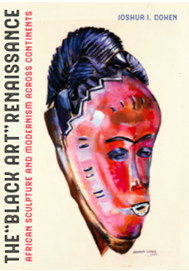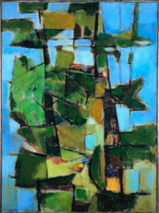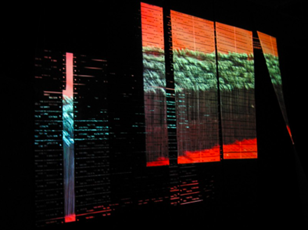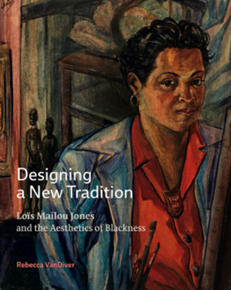CAA News Today
CAA’s 109th Annual Business Meeting Minutes
posted Feb 11, 2022
COLLEGE ART ASSOCIATION
109TH ANNUAL BUSINESS MEETING
FRIDAY, FEBRUARY 12, 2021 2:00 P.M. EST
MINUTES
- Call to Order/Opening Remarks
- President Elizabeth Schlatter called the meeting to order at 2:02 p.m. EST. She thanked the staff for their enormous efforts. She then acknowledged the diverse people linked to the land on which she works and lives, particularly those who have been displaced from that land.
- Executive Director’s Report
- Meme Omogbai offered a reflection on the importance of this conference. It is amazing we were able to offer the extensive content we did during a pandemic, specifically:
- 365 sessions, over 1100 individual presentations in addition to a book and trade fair. Intersectionality between the visual arts, climate change, eco-feminism, and many other topics.
- The virtual format of the conference has offered a new level of access. Content is available across the world and for a month after the conference.
- The conference will serve as an important turning point in the history of CAA toward achieving the four pillars of its Strategic Repositioning:
- Long term sustainability of the organization through attention to meeting the needs of all segments of our constituency and maximizing the value of membership
- Social Entrepreneurship and e-commerce
- Technological infrastructure towards a digital transformation to ensure effective and efficient operations and delivery of content
- Robust development activities
- Meme Omogbai offered a reflection on the importance of this conference. It is amazing we were able to offer the extensive content we did during a pandemic, specifically:
- Approval of the minutes from the February 2020 annual meeting.
- Approval of Minutes of 108th Annual Business Meeting, held in two parts, February 12, and February 14, 2020
- Jaqueline Francis moved; Laura Anderson Barbata seconded. The minutes were approved unanimously.
- Financial report
- CFO Bob Tofolo reported on the following items:
- The association posted a breakeven operating budget for FY20.
- The association continues to operate under a break-even budget for FY21. This includes $3.3M in current expenses against equivalent revenue.
- A PPP loan of $372,000 was awarded to CAA. That loan was subsequently forgiven last December.
- The endowment market value on June 30, 2020 was $9.825M vs prior year of $9.6M
- Member count for this year vs. last: As of June 30, 2020, there were 6,699 (7,773, -14%) individual members. There were 443 (464) organizational members and an additional 586 (617, -5%) subscribers to The Art Bulletin and/or Art Journal through our co-publisher Taylor and Francis. These numbers are not exactly comparative as prior year memberships reflect exaggerated increases due to discounts that are absent this year.
- 3938 registered attendees at the conference as of this morning. It is expected to be over 4000 by tomorrow.
- Question (posed by a member in attendance): how did numbers compare to the last NYC conference? 2019 attendance was over 5000, but the numbers from this year’s count include registrations for Free and Open sessions which we would not have tracked in prior years so some additional work needs to be done so that we can compare apples to apples.
- CFO Bob Tofolo reported on the following items:
- New Business
- The following question was posed by a member in attendance: Considering technical issues that have emerged this year, will CAA be evaluating Confex and considering whether they are the best vendor to use moving forward? Elizabeth indicated that the organization would be evaluating all aspects of the conference, including the platform. Meme added that in the midst of this digital transformation, there will be a consolidation of different systems that will address some of the issues that emerged. She encouraged people to fill out the conference surveys that are being administered.
- Results of Election of New Directors
- Elizabeth announced the newly elected CAA Board Members:
- Roland Betancourt
- Lara Evans
- Wanda Raimundi-Ortiz
- Kelly Walters
- Kelvin Parnell Jr. (Emerging Professional)
- Elizabeth announced the newly elected CAA Board Members:
- Adjournment
- The meeting was adjourned at 2:25 p.m. EST.
Respectfully submitted by Colin Blakely, Secretary.
CAA’s 110th Annual Business Meeting Agenda
posted Feb 11, 2022
CAA Annual Business Meeting Agenda
Friday, February 18, 2022
1 p.m. CT
The 110th Annual Business Meeting of the members of the College Art Association will be called to order at 1 p.m. CT on Friday, February 18 at the 2022 Annual Conference. Access to this meeting is included in paid registration and can also be accessed by registering for ”No-cost registration”. Once you have registered, please log into the online conference schedule to attend the meeting.
CAA President, N. Elizabeth Schlatter will preside.
- Welcome + Call to Order – N. Elizabeth Schlatter, CAA President
- Executive Director’s Report – Meme Omogbai, CAA Executive Director + CEO
- Approval of Minutes of 109th Annual Business Meeting [ACTION ITEM]
- Financial Report – Georgia Harrell, CAA Treasurer + Robert Tofolo, CAA Head of Operations
- Old/New Business
- Board Member Election Results – N. Elizabeth Schlatter, CAA President
- Adjourn
Proxies
If you are unable to attend the Annual Business Meeting, kindly complete a proxy online to appoint the individuals named thereon to (i) vote, as directed by you, for directors, and, at their discretion, on such other matters as may properly come before the Annual Business Meeting; and (ii) vote on any and all adjournments thereof. A proxy, with your vote for directors, must be received no later than 5 p.m. CT Thursday, February 17th, 2022.
Next Meeting – 2023
The 111th Annual Business Meeting of the College Art Association will be held in New York in 2023, precise date to be announced.
Black History Month and Art Journal Open
posted Feb 10, 2022
Each week this Black History Month, we highlight the rich scholarship and programs produced at CAA that celebrate, recognize, and interrogate Black art, history, and experience. This week, we are sharing a bibliography of articles from our online, open-access journal Art Journal Open that addresses these topics.
 Aranke, Sampada. “Objects Made Black.” Art Journal Open (February 9, 2015). Crossover article from Art Journal 73, no. 3 (Fall 2014) reviewing Huey Copeland, Bound to Appear: Art, Slavery, and the Site of Blackness in Multicultural America, Chicago: University of Chicago Press, 2013. Aranke, Sampada. “Objects Made Black.” Art Journal Open (February 9, 2015). Crossover article from Art Journal 73, no. 3 (Fall 2014) reviewing Huey Copeland, Bound to Appear: Art, Slavery, and the Site of Blackness in Multicultural America, Chicago: University of Chicago Press, 2013. |
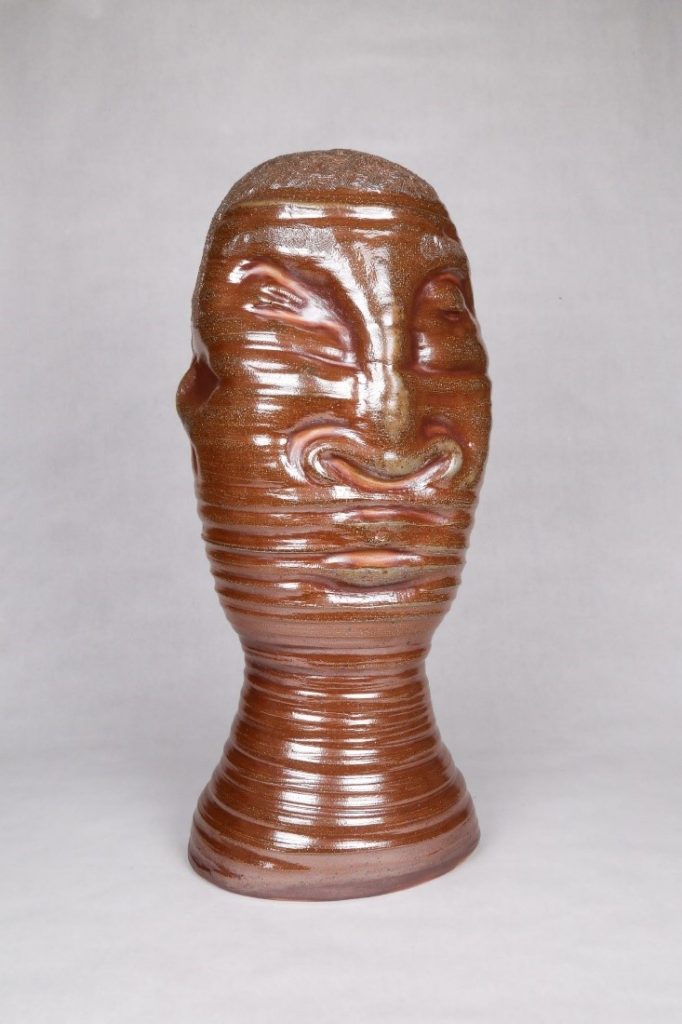
Baralaye, Ebitenyefa and Glenn Adamson. “The Weight of Matter: Ebitenyefa Baralaye and Glenn Adamson in Conversation.” Art Journal Open (May 20, 2021). Ebitenyefa Baralaye, Portrait I (multiple views), 2020, salt-glazed stoneware, 25 x 12 x 10 in.
|
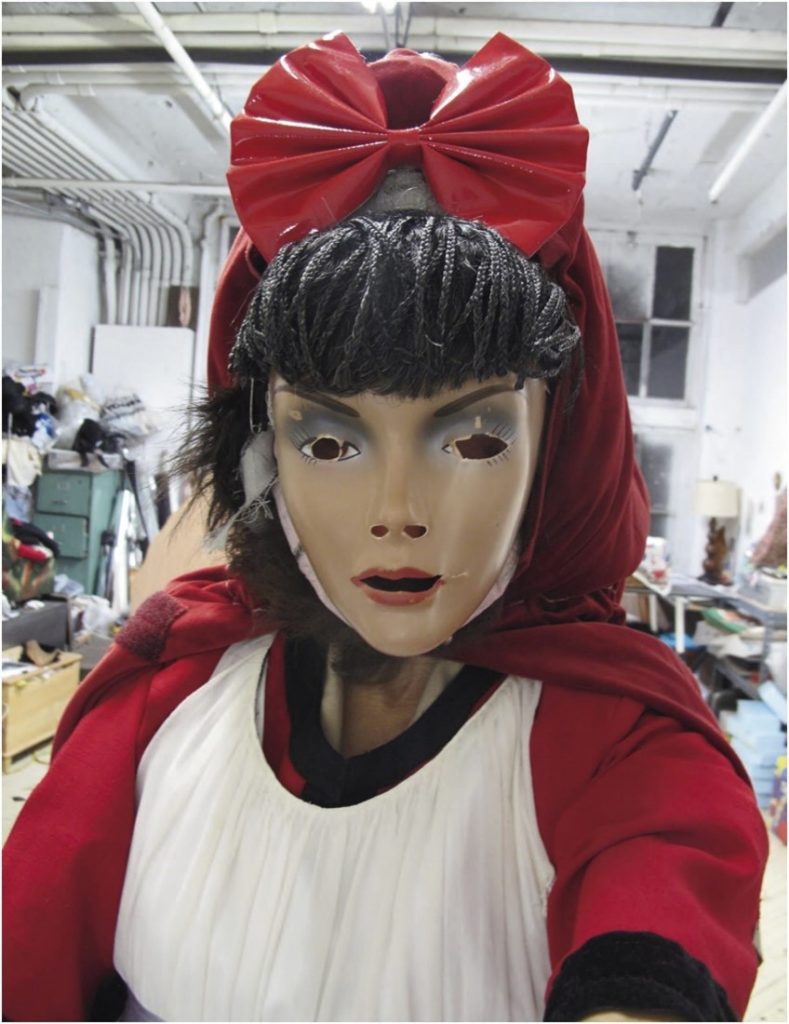
Barber, Tiffany E. “Narcissister, a Truly Kinky Artist.” Art Journal Open (March 11, 2020). Narcissister, Red Riding Hood, 2014, mixed media (photograph provided by the artist).
|

Best, Makeda. “Interview with Texas Isaiah.” Art Journal Open (April 8, 2021). Crossover article from Art Journal 80, no. 1 (Spring 2021). Texas Isaiah, don’t kill this vibe, 2018 (artwork © Texas Isaiah; photograph provided by the artist)
|
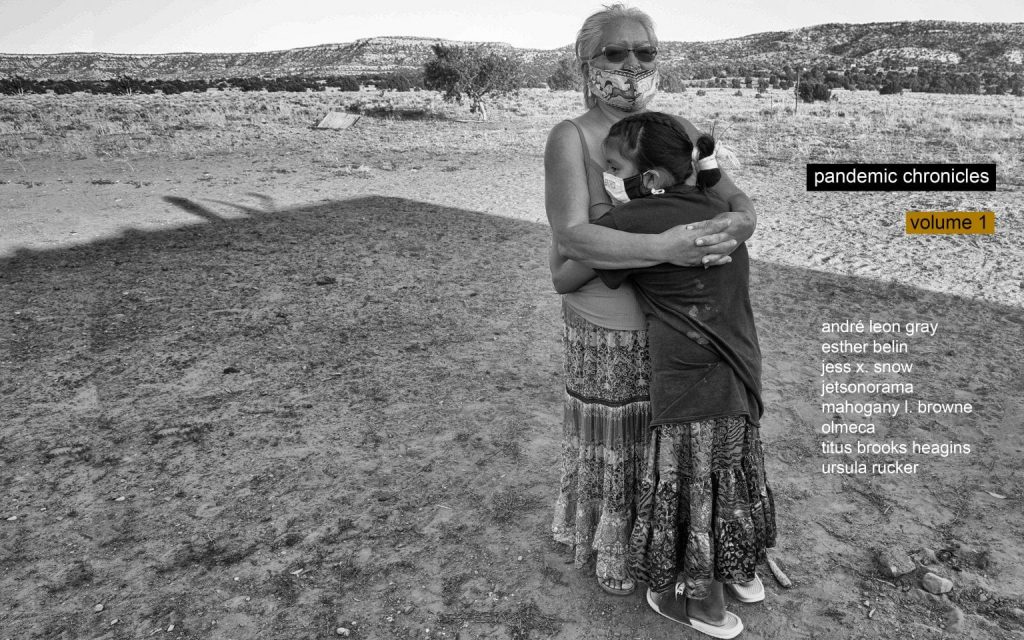
Childs, Adienne L. Riffs and Relations: African American Artists and the European Modernist Tradition. Washington, DC and New York: Phillips Collection in association with Rizzoli Electa, 2020. Sanford Biggers, Negerplastik, 2016, repurposed antique quilt, cotton fabric fragments, tar, and glitter, 81 × 76 3/4 in. (205.7 x 195 cm) (photograph by Todd-White Art Photography, provided by Massimo De Carlo, Milan/London/Hong Kong)
|
 Cunningham, Nijah. “With Each Other.” Art Journal Open (October 14, 2021). Crossover article from Art Journal 80, no. 3 (Fall 2021) reviewing Nicole R. Fleetwood. Marking Time: Art in the Age of Mass Incarceration. Cambridge, MA: Harvard University Press, 2020. Cunningham, Nijah. “With Each Other.” Art Journal Open (October 14, 2021). Crossover article from Art Journal 80, no. 3 (Fall 2021) reviewing Nicole R. Fleetwood. Marking Time: Art in the Age of Mass Incarceration. Cambridge, MA: Harvard University Press, 2020. |

Dally, Jenny and Fred Eversley. “The Object and You: Fred Eversley in Conversation with Jenny Dally.” Art Journal Open (February 25, 2021). Fred Eversley in his Venice Beach studio, 2018 (photograph by Elon Schoenholz; photograph provided by David Kordansky Gallery, Los Angeles)
|
 Gaines, Malik. “City after Fifty Years’ Living: LA’s Differences in Relation.” Art Journal Open (July 17, 2012). Gaines, Malik. “City after Fifty Years’ Living: LA’s Differences in Relation.” Art Journal Open (July 17, 2012).
Ice Cube Celebrates the Eames, poster, 2011 (artwork © J. Paul Getty Trust)
|

Gale, Nikita and Jesús Fuenmayor. “Barricades of Silence: Nikita Gale in Conversation with Jesús Fuenmayor.” Art Journal Open (August 20, 2020). Nikita Gale, INTERCEPTOR, 2019, installation view, Fall Apart: Nikita Gale & Pat O’Neill, Martos Gallery, New York, January 11–February 24, 2019 (artwork © Nikita Gale; photograph by Charles Benton/Martos Gallery, provided by the artist),
|

Gbadegesin, Olubukola A. “Damon Davis’s Negrophilia: Encounters with Black Death.” Art Journal Open (August 30, 2017). Damon Davis, Untitled (2), 2015, bookprint, ink, watercolor, adhesive, from the series Negrophilia (artwork © Damon Davis)
|

Majeed, Risham and Blake Bradford. “Just Being.” Art Journal Open (May 22, 2020). Albrecht Dürer, Portrait of a Black Man (untitled), 1508, black chalk on paper. Original shown here; the NMAAHC has a reproduction in the Middle Passage galleries.
|

Raiford, Leigh. “Burning All Illusion: Abstraction, Black Life, and the Unmaking of White Supremacy.” Art Journal Open (January 14, 2021). Samuel Levi Jones, Joshua, 2016, deconstructed Illinois law books on canvas, 61½ x 77 in. (156.2 x 195.6 cm) (artwork © Samuel Levi Jones; photograph provided by Galerie Lelong)
|
 Sifuentes, Aram Han. “How Internalized White Supremacy Manifests for My BIPOC Students in Art School.” Art Journal Open (July 8, 2021). Sifuentes, Aram Han. “How Internalized White Supremacy Manifests for My BIPOC Students in Art School.” Art Journal Open (July 8, 2021).
Cute Rage Press (Aram Han Sifuentes and Ishita Dharap), detail of Taking Receipts:
|
| Saggese, Jordana Moore, Cauleen Smith, Charles Gaines, Edgar Arceneaux, Howardena Pindell, Michael Ray Charles, and Glenn Ligon. “A Call to Artists.” Art Journal Open (October 26, 2021). Crossover article from Art Journal 80, no. 3 (Fall 2021).
|

Tani, Ellen Y. “Come Out to Show Them: Speech and Ambivalence in the Work of Steve Reich and Glenn LigonSpeech and Ambivalence in the Work of Steve Reich and Glenn Ligon.” Art Journal Open (December 23, 2019). Glenn Ligon, Come Out Study #13, 2014, silkscreen on canvas on panel, 36 x 47 7/8 in. (91.4 x 121.6 cm) (artwork © Glenn Ligon; photograph by Ronald Amstutz, provided by the artist, Hauser & Wirth, New York, Regen Projects, Los Angeles, Thomas Dane Gallery, London, and Chantal Crousel, Paris)
|

Thompson, Krista. ““I WAS HERE BUT I DISAPEAR”: Ivanhoe “Rhygin” Martin and Photographic Disappearance in Jamaica.” Art Journal Open (August 14, 2018). Production still from The Harder They Come, 1972, 16mm color film, dir. Perry Henzell, cinematography by Frank St. Juste, David McDonald, and Peter Jessop, produced by International Films / Xenon Pictures (photograph published under fair use)
|
 Williams, Stephanie Sparling. “Artful Embodiment: Genealogies of the Impossible.” Art Journal Open (November 27, 2018). Crossover article from Art Journal 77, no. 3 (Fall 2018) reviewing Uri McMillan, Embodied Avatars: Genealogies of Black Feminist Art and Performance, New York: New York University Press, 2015. Williams, Stephanie Sparling. “Artful Embodiment: Genealogies of the Impossible.” Art Journal Open (November 27, 2018). Crossover article from Art Journal 77, no. 3 (Fall 2018) reviewing Uri McMillan, Embodied Avatars: Genealogies of Black Feminist Art and Performance, New York: New York University Press, 2015. |
 Winslow, Margaret. “Pope.L: The Body and Its Void.” Art Journal Open (January 14, 2021). Crossover article from Art Journal 79, no. 4 (Winter 2020) reviewing member: Pope.L, 1978–2001., exhibition organized by Stuart Comer with Danielle A. Jackson. Museum of Modern Art, New York, October 21, 2019–February 1, 2020. Winslow, Margaret. “Pope.L: The Body and Its Void.” Art Journal Open (January 14, 2021). Crossover article from Art Journal 79, no. 4 (Winter 2020) reviewing member: Pope.L, 1978–2001., exhibition organized by Stuart Comer with Danielle A. Jackson. Museum of Modern Art, New York, October 21, 2019–February 1, 2020. |

Zorach, Rebecca. “Art and Soul: An Experimental Friendship between Street and Museum .” Art Journal Open (September 4, 2011). Art & Soul exterior with Rainbow mural by Sachio Yamashita, 1969 (mural now destroyed) (mural artwork © Eileen Petersen Yamashita, all rights reserved, used with permission; photograph © Ann Zelle)
|
CAA Intern Spotlight
posted Feb 10, 2022
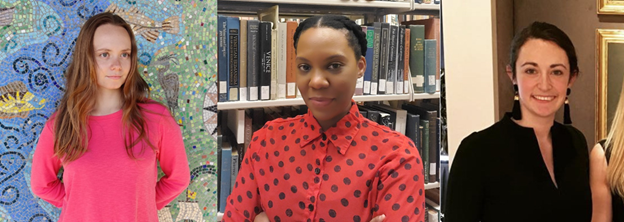
This week, CAA spotlights its three amazing interns who have been working with CAA since early fall 2021: Development Intern, Viktoriya Molchanova, Editorial Intern, Keshawna Mooney, and Grants Administration Intern, Astrid Tvetenstand. Learning to work remotely for an organization as a young professional is no small feat and we thank them for their dedication, enthusiasm, and support.
Development Intern: Viktoriya Molchanova
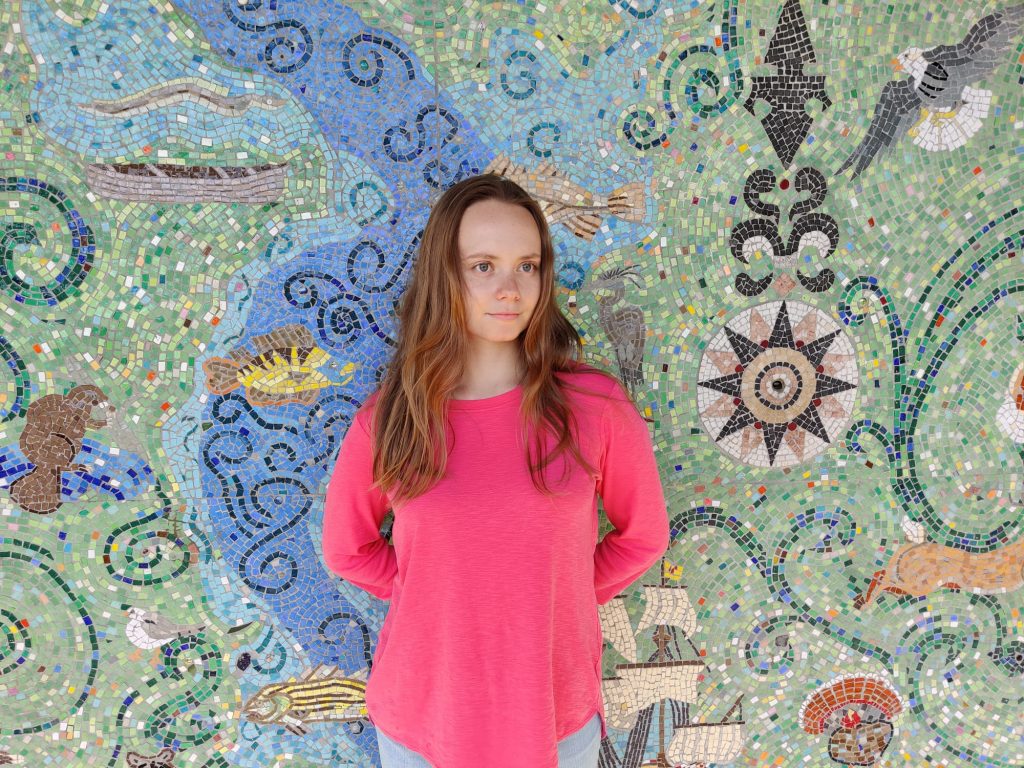
How has your experience at CAA affected you?
As a flutist with a performing arts background, I did not know much about the visual arts. As an aspiring future arts administrator, I wanted to take an internship at CAA to expand my knowledge and work experience specifically in the visual arts. Throughout these months, I have gained a deeper understanding of the visual arts world from its accomplished scholars to its dedicated funders. My great-grandfather was a visual arts scholar and attended many international visual arts conferences. I am happy to continue his legacy through my internship at CAA.
What is your favorite kind of art and why?
My favorite art is The Unicorn Rests in a Garden from the Unicorn Tapestries at the Met. The tapestry reminds me of a time when I arrived in elementary school as a first generation immigrant. It was challenging to learn the English language and assimilate into a new culture. However, the arts education at my school helped me overcome my struggles. My visual arts teacher saw that I enjoyed looking through his art book on unicorns. As a kind gesture, he gave me the book as a gift. After all these years, I still keep book as a reminder of the transformative power of arts education on my life and career.
Viktoriya Molchanova is a graduate student in the Arts Administration Master’s program at Baruch College and holds two Bachelor’s in Arts Management and Classical Instrumental Performance from Purchase College. She won the Nagelberg Family Scholarship in Arts Administration in 2021 and the SAMMIE Award for Outstanding Achievement in Arts Management in 2020. Viktoriya is in her last semester at Baruch College and is writing her Master’s thesis. Viktoriya is happy to connect on LinkedIn.
Editorial Intern: Keshawna Mooney
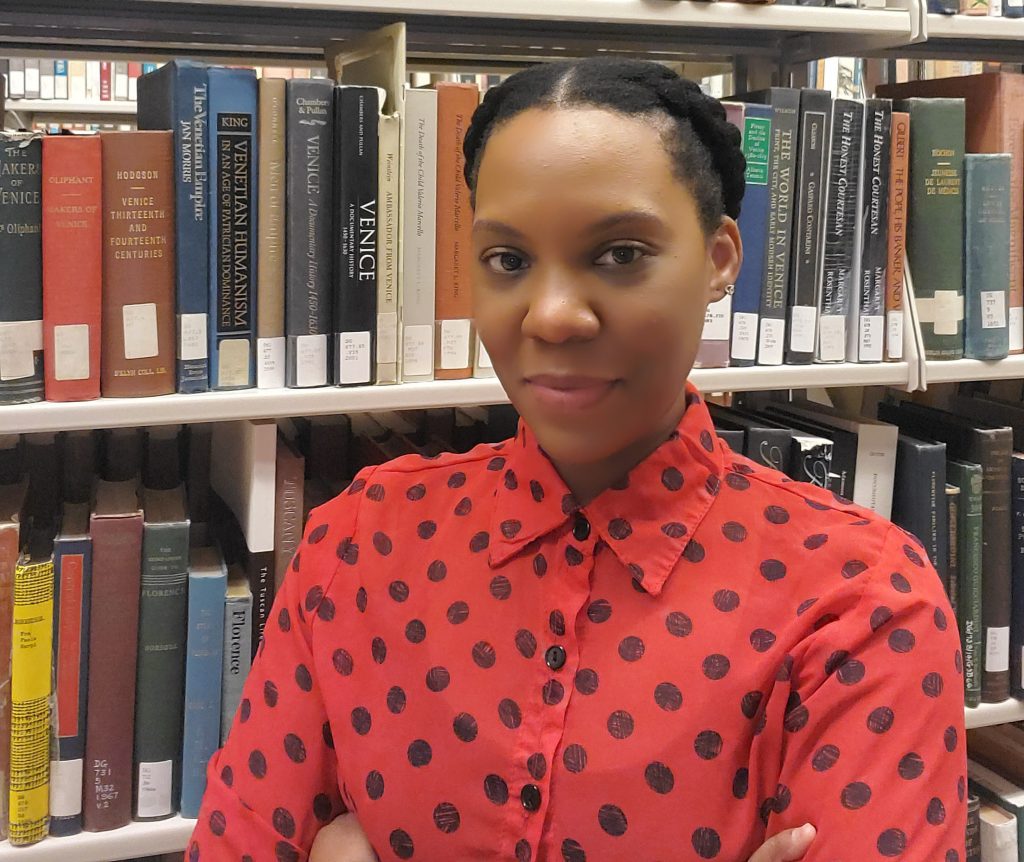
How has your experience at CAA affected you?
My internship at CAA has been an amazing experience. I have learned so much about the publishing process and become more familiar with specific style guides which were both specific goals I had for myself. It has been great to work with such an encouraging supervisor that has allowed me to advance these skills and grow as a young professional. I am also proud to have been part of the team that assists artists, scholars, and other art lovers in presenting their work and ideas to an audience.
What was something you learned that was unexpected?
I have been amazed to learn the amount of work that goes into journal publishing. Being able to work on all journals simultaneously has been exciting and learning to prioritize while juggling multiple projects has helped strengthen my time management skills even further. I have also discovered that the editing process is a much more collaborative experience as opposed to solitary, and it feels great to know that I have support and guidance when I need it.
What is your favorite kind of art and why?
While I love all forms of art, my favorite kind of visual art would be street art because you can find it almost anywhere and sometimes in the most unexpected places. In addition to its accessibility, street art takes concepts many of us recognize and positions them in ways so relatable that tells us we are seen and maybe even understood. Some of my favorite street artists include DAZE, Bambi, and WRDSMTH.
Keshawna Mooney is an Editorial Intern at CAA. She is a junior at CUNY Brooklyn College majoring in English and Creative Writing. Her goal is to present multilayered characters in their most complicated, contradictory, and raw forms. She is also a winner of the 2021 James Tolan Award for her essay “Lolita: The Unknowingly Irresponsible Girl Child.” She has worked as a supplemental instructor at BMCC working with students to develop and improve their writing skills and as an English literacy volunteer with adult populations. After graduation she hopes to be able to continue doing the work she loves, telling interesting stories and helping others tell theirs. In her spare time, you can find her wandering around art museums, enjoying theater, or curled up with a good book.
Grants Administration Intern: Astrid Tvetenstrand
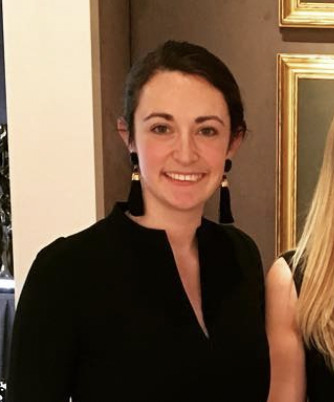
How has your experience at CAA affected you?
Working at CAA has exposed me to the larger community of art historians outside my discipline. Everyone at CAA is building a productive network of professionals, scholars, emerging leaders in the field who are building each other up and sharing resources. I have learned so much about how grants and awards are administered to simultaneously give people more opportunities for their work.
What was something you learned that was unexpected?
I learned that juries make hard decisions and are ultimately trying to celebrate and grant as many projects as possible. Before working at CAA, I had only ever experienced the application process and had not given too much thought to what happens after you click the submit button. Listening to the juries’ debate was illuminating and FUN. The process is complex, intellectual, and ultimately much more nuanced than I previously thought.
What is your favorite kind of art and why?
I love nineteenth-century American landscape painting because it is beautiful, complicated, and speaks to so many important themes and topics within our shared history.
Astrid Tvetenstrand is a fourth year PhD candidate in the American & New England Studies program at Boston University. She studies the history of American painting, decorative arts, and architecture. She explores these fields through practices of collection, economic development, and the consumption of American property. Her dissertation examines late nineteenth-century American landscape painting’s role in the creation of seasonal colonies. By investigating art’s relationship to the development of property, she analyzes the socioeconomic framework which shaped both the visual content and physical market of landscape painting. She looks at the role of nature in the lives of nineteenth-century Americans and how it influenced the creation of art and commerce in the United States.
Black History Month and caa.reviews
posted Feb 03, 2022
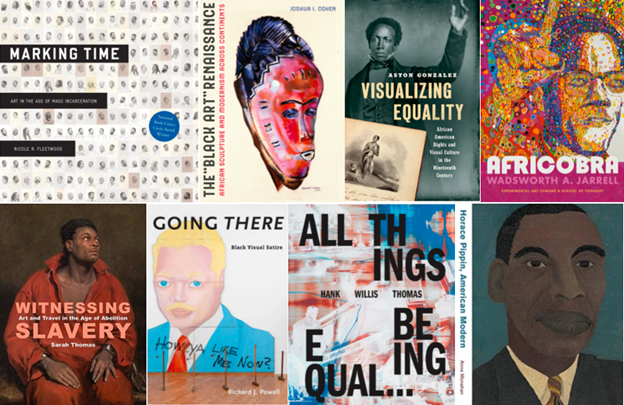
Each week this Black History Month, we highlight the rich scholarship and programs produced at CAA that celebrate, recognize, and interrogate Black art, history, and experience. This week, we are sharing a bibliography of publications and exhibitions reviewed on our online, open-access journal caa.reviews from this past year that addresses these topics.
caa.reviews also houses rosters of dissertation titles in progress and completed since 2002 and many long-form essays that intersect with these themes as well, such as current Editor-in-Chief of Art Journal, Eddie Chambers, essay Reflections on African and African Diaspora Art from 2016.
 Childs, Adienne L. Riffs and Relations: African American Artists and the European Modernist Tradition. Washington, DC and New York: Phillips Collection in association with Rizzoli Electa, 2020.
Childs, Adienne L. Riffs and Relations: African American Artists and the European Modernist Tradition. Washington, DC and New York: Phillips Collection in association with Rizzoli Electa, 2020.
Sanford Biggers, Negerplastik, 2016, repurposed antique quilt, cotton fabric fragments, tar, and glitter, 81 × 76 3/4 in. (205.7 x 195 cm) (photograph by Todd-White Art Photography, provided by Massimo De Carlo, Milan/London/Hong Kong)
 Choi, Connie H., Thelma Golden, and Kellie Jones. Black Refractions: Highlights from the Studio Museum in Harlem. New York: Rizzoli Electa, 2019.
Choi, Connie H., Thelma Golden, and Kellie Jones. Black Refractions: Highlights from the Studio Museum in Harlem. New York: Rizzoli Electa, 2019.
Jordan Casteel, Kevin the Kiteman, 2016, oil on canvas, 78 x 78 in. (198.1 x 198.1 cm). The Studio Museum in Harlem, New York, Museum purchase with funds provided by the Acquisition Committee 2016.37 (artwork © Jordan Casteel; photograph by Adam Reich, provided by American Federation of Arts)
Cohen, Joshua I. The “Black Art” Renaissance: African Sculpture and Modernism across Continents. Oakland: University of California Press, 2020.
David Driskell: Icons of Nature and History. Atlanta and New York: High Museum of Art and Rizzoli Electa, 2021.
David Driskell, Young Pines Growing, 1959, oil on canvas. Clark Atlanta University Art Museum, John Hope Franklin Purchase Award (artwork © Estate of David C. Driskell; photograph provided by High Museum of Art)
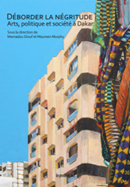 Diouf, Mamadou and Maureen Murphy, editors. Déborder la négritude: Arts, politique et société à Dakar. Dijon. France: Les presses du réel, 2020.
Diouf, Mamadou and Maureen Murphy, editors. Déborder la négritude: Arts, politique et société à Dakar. Dijon. France: Les presses du réel, 2020.
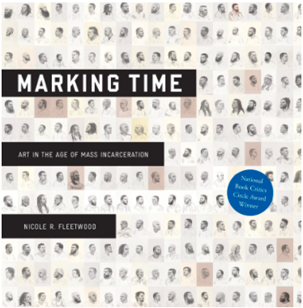 Fleetwood, Nicole R. Marking Time: Art in the Age of Mass Incarceration. Cambridge, MA: Harvard University Press, 2020.
Fleetwood, Nicole R. Marking Time: Art in the Age of Mass Incarceration. Cambridge, MA: Harvard University Press, 2020.
 Gonzalez, Aston. Visualizing Equality: African American Rights and Visual Culture in the Nineteenth Century. John Hope Franklin Series in African American History and Culture. Chapel Hill: University of North Carolina Press, 2020.
Gonzalez, Aston. Visualizing Equality: African American Rights and Visual Culture in the Nineteenth Century. John Hope Franklin Series in African American History and Culture. Chapel Hill: University of North Carolina Press, 2020.
 Hank Willis Thomas: All Things Being Equal . . . New York and Portland, OR: Aperture Foundation in association with Portland Art Museum, 2018.
Hank Willis Thomas: All Things Being Equal . . . New York and Portland, OR: Aperture Foundation in association with Portland Art Museum, 2018.
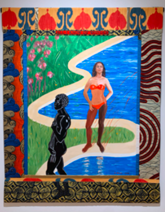 Harris, Shawnya L.,editor. Emma Amos: Color Odyssey. Athens: Georgia Museum of Art, University of Georgia, 2021.
Harris, Shawnya L.,editor. Emma Amos: Color Odyssey. Athens: Georgia Museum of Art, University of Georgia, 2021.
Emma Amos, All I Know of Wonder, 2008, oil on linen, African fabric, 70 1/2 x 55 1/2 in. (179.1 x 141 cm), installation view, Emma Amos: Color Odyssey, Georgia Museum of Art, University of Georgia, Athens, 2021 (photograph by the author)
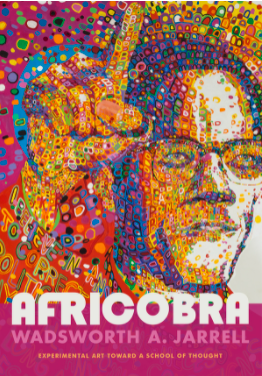 Jarrell, Wadsworth A. AFRICOBRA: Experimental Art toward a School of Thought. Durham, NC: Duke University Press, 2020.
Jarrell, Wadsworth A. AFRICOBRA: Experimental Art toward a School of Thought. Durham, NC: Duke University Press, 2020.
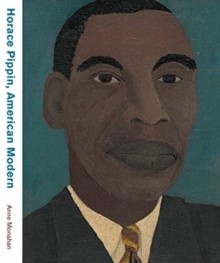 Monahan, Anne. Horace Pippin, American Modern. New Haven, CT: Yale University Press, 2020.
Monahan, Anne. Horace Pippin, American Modern. New Haven, CT: Yale University Press, 2020.
Mühling, Matthias and Stephanie Weber, editors. Senga Nengudi: Topologies. Munich: Hirmer, 2021.
Senga Nengudi, Warp Trance, 2007, multi-channel audio/video installation in collaboration with the Fabric Workshop and Museum, Philadelphia, with a sound composition by Butch Morris, installation view, Senga Nengudi: Topologies, Philadelphia Museum of Art, 2021 (photograph © Aaron Igler, provided by the artist and The Fabric Workshop and Museum)
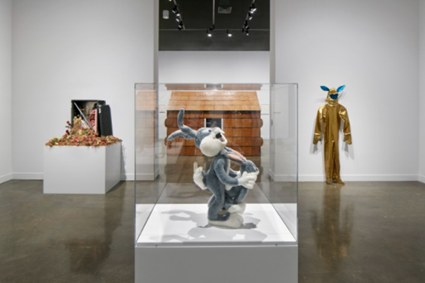 No Wrong Holes: Thirty Years of Nayland Blake. Los Angeles and Cambridge, MA: Institute of Contemporary Art and MIT List Visual Arts Center (online), 2020.
No Wrong Holes: Thirty Years of Nayland Blake. Los Angeles and Cambridge, MA: Institute of Contemporary Art and MIT List Visual Arts Center (online), 2020.
No Wrong Holes: Thirty Years of Nayland Blake, installation view, MIT List Visual Arts Center, Cambridge, MA, 2020–21 (photograph © Charles Mayer, provided by MIT List Visual Arts Center)
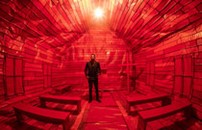 Oliver, Valerie Cassel. The Dirty South: Contemporary Art, Material Culture, and the Sonic Impulse. Richmond, VA and Durham, NC: Virginia Museum of Fine Arts in association with Duke University Press, 2021.
Oliver, Valerie Cassel. The Dirty South: Contemporary Art, Material Culture, and the Sonic Impulse. Richmond, VA and Durham, NC: Virginia Museum of Fine Arts in association with Duke University Press, 2021.
Rodney McMillian, Asterisks in Dockery (Blues for Smoke), 2021, vinyl, thread, wood, paint, lightbulb, installation view, The Dirty South: Contemporary Art, Material Culture, and the Sonic Impulse, Virginia Museum of Fine Arts, 2021 (photograph © Sandra Sellars, provided by Virginia Museum of Fine Arts)
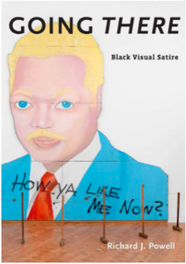 Powell, Richard J. Going There: Black Visual Satire. Cambridge, MA and New Haven, CT: Hutchins Center for African & African American Research in association with Yale University Press, 2020.
Powell, Richard J. Going There: Black Visual Satire. Cambridge, MA and New Haven, CT: Hutchins Center for African & African American Research in association with Yale University Press, 2020.
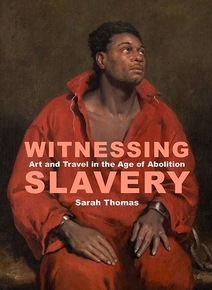 Thomas, Sarah. Witnessing Slavery: Art and Travel in the Age of Abolition. London and New Haven: Paul Mellon Centre for Studies in British Art in association with Yale University Press, 2019.
Thomas, Sarah. Witnessing Slavery: Art and Travel in the Age of Abolition. London and New Haven: Paul Mellon Centre for Studies in British Art in association with Yale University Press, 2019.
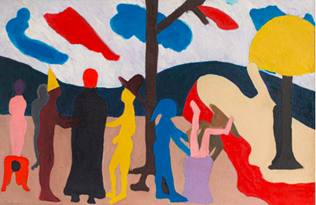 Tuite, Diana, editor. Bob Thompson: This House Is Mine. Waterville, ME and New Haven, CT: Colby College Museum of Art in association with Yale University Press, 2021.
Tuite, Diana, editor. Bob Thompson: This House Is Mine. Waterville, ME and New Haven, CT: Colby College Museum of Art in association with Yale University Press, 2021.
Bob Thompson, The Snook (The Sack), 1961, oil on canvas, 23 1/2 x 36 in. (59.7 x 91.4 cm). Collection of Andrew Nelson (© Michael Rosenfeld Gallery LLC, New York)
VanDiver, Rebecca. Designing a New Tradition: Loïs Mailou Jones and the Aesthetics of Blackness. University Park, PA: Penn State University Press, 2020.
Digital Humanities at the 110th Annual Conference
posted Feb 03, 2022

The upcoming Annual Conference this winter and spring will feature a number of sessions that discuss issues related to the digital humanities and art. See below for links to explore sessions that relate to these topics in the conference schedule.
See the rest of this year’s conference schedule online! Register for CAA’s upcoming conference and learn more at our registration page. After you register, sign into the app and create your own custom schedule using the tools and filtering options on the side (switch time zones in the upper left of the app: CST for in-person and your own time zone for virtual).
Sessions on Digital Humanities
Critical Cataloging Conversations in Teaching, Research, and Practice
VISUAL RESOURCES ASSOCIATION (VRA)
Friday, February 18, 2022
11:00 a.m. – 12:30 p.m. CST (12:00 p.m. – 1:30 p.m. EST)
Bridget Madden, University of Chicago
Dismantling the Patriarchal Canon: Foregrounding Women Artists and Patrons through Digital Art History
DIGITAL ART HISTORY SOCIETY
Friday, March 4, 2022
11:00 a.m. – 12:30 p.m. CST (12:00 p.m. – 1:30 p.m. EST)
Tracy Chapman Hamilton
Dana Hogan, Duke University
Mariah Proctor-Tiffany, California State University, Long Beach
Archival Imaginaries and Futurities in Contemporary Art from SWANA
Saturday, February 19, 2022
4:30 p.m. – 6:00 p.m. CST (5:30 p.m. – 7:00 p.m. EST)
Lara Fresko Madra, Cornell University
Kareem Estefan, Brown University
New frontiers: creating, collecting, preserving and displaying digital based art of Russia and Eastern Europe
Saturday, February 19, 2022
4:30 p.m. – 6:00 p.m. CST (5:30 p.m. – 7:00 p.m. EST)
Natalia Kolodzei, Kolodzei Art Foundation
The Living Catalogue Raisonné
CATALOGUE RAISONNÉ SCHOLARS ASSOCIATION
Saturday, February 19, 2022
9:00 a.m.– 10:30 a.m. CST (10:00 a.m. – 11:30 a.m. EST)
Joan Pachner
Marin R Sullivan, Sculptural Things
Digital Realms in Practice
Thursday, February 17, 2022
4:30 p.m.- 6:00 p.m. CST (5:30 p.m. – 7:00 p.m. EST)
Diverse Resources for New Media
Thursday, February 17, 2022
4:30 p.m.- 6:00 p.m. CST (5:30 p.m. – 7:00 p.m. EST)
Nadav Assor, Connecticut College
New frontiers: creating, collecting, preserving and displaying digital based art of Russia and Eastern Europe
Saturday, February 19, 2022
4:30 p.m.- 6:00 p.m. CST (5:30 p.m. – 7:00 p.m. EST)
Natalia Kolodzei
Kolodzei Art Foundation
Making Media Social: An Examination of Video and Television in the History of Political Activism of the 1970s
Thursday, February 17, 2022
9:00 a.m.– 10:30 a.m. CST (10:00 a.m. – 11:30 a.m. EST)
Corinna Kirsch, Stony Brook University
Brock Lownes, Stony Brook University
The Problem of Mapping Social Justice On The Social (Creative) Body In an Era Of NFT’s
Saturday, March 5, 2022
11:00 a.m. – 12:30 p.m. CST (12:00 p.m. – 1:30 p.m. EST)
Gale Elston, CUNY
(inappropriate) digital intimacies
Saturday, March 5, 2022
2:30 p.m. – 4:00 p.m. CST (3:30 p.m. – 5 p.m. EST)
Francesca Balboni, University of Texas at Austin
Meet the 2022 CAA Annual Conference Support Grant Recipients
posted Feb 03, 2022
CAA offers Annual Conference support grants to graduate students in art history and to international artists and scholars. Meet this year’s recipients of our named support grants and find information about their presentations at the conference and their corresponding session below. Dozens of other support grants were given to CAA members through the Presidents Council of CAA and the “Pay it Forward” initiative.
CAA TRAVEL GRANT IN MEMORY OF ARCHIBALD CASON EDWARDS, SENIOR, AND SARAH STANLEY GORDON EDWARDS
The CAA Support Grant in Memory of Archibald Cason Edwards, Senior, and Sarah Stanley Gordon Edwards was made possible by Mary D. Edwards. The grant supports women who are emerging scholars at either an advanced stage of pursuing a doctoral degree or who have received their PhD within the two years prior to the submission of the application.
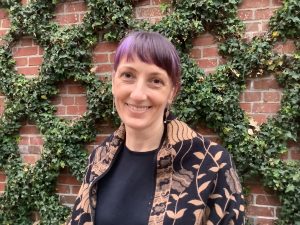
Kristan Hanson, Dumbarton Oaks
Presentation at the Annual Conference: “Nurturing Growth: Eva Gonzalès’s La Plante favorite and Berthe Morisot’s Fillette aux jacinthes”
Session: Enchanted by Nature: Picturing Gendered Plants and Female Agency in Europe and China (17th – 19th Century)
Kristan M. Hanson is an art historian and plant humanist. Her research examines the historical significance of individual plants and botanical forms in art to deepen understandings of human/plant interactions and anthropogenic environmental change. She currently holds a consultancy as Managing Digital Editor for the Plant Humanities Initiative at Dumbarton Oaks, prior to which she was a 2020–2021 academic year fellow. Hanson has also received fellowships and awards to support her research from the Oak Spring Garden Foundation, HASTAC Scholars program, Hall Center for the Humanities, and Institute for Digital Research in the Humanities.
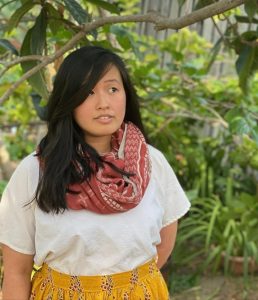
Cynthia Kok, Yale University
Presentation at the Annual Conference: “’Een bloempoth van parlemoer’: Painting Life in Dirck van Rijswijck’s Mother-of-Pearl Floral Panels”
Session: Analogous Matter: Skeuomorphism as Method
Cynthia Kok is a Ph.D. candidate at Yale University. Her dissertation focuses on sensorial engagement in making and craft experiments with mother-of-pearl in the early modern Dutch world. Cynthia received her MA from Bard Graduate Center and her BA from the University of California, Berkeley. She has held curatorial internships at the Metropolitan Museum of Art’s Costume Institute, the Frick Collection, and the Smithsonian American Art Museum and she is the 2021-2023 Kress History of Art Institutional Fellow at the Leiden University Centre for the Arts in Society (LUCAS).
Honorable Mention:
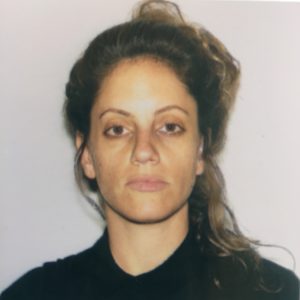
Shoghig Halajian, University of California San Diego
Presentation at the Annual Conference: “Destroying the Form: On the Spatial Politics of Rafa Esparza’s bust: A Mediation on Freedom”
Session: Monumentality in Art: Memory, History, and Impermanence in Diaspora
Shoghig Halajian is a curator and art historian, who serves on the Board of Directors at Human Resources LA and was previously Assistant Director at LACE (Los Angeles Contemporary Exhibitions). She is co-editor of the online journal Georgia, in collaboration with Anthony Carfello and Suzy Halajian, which is supported by a Creative Capital | Andy Warhol Foundation Arts Writers Grant. She has presented projects at the Hammer Museum and the ONE Archives at USC Libraries in Los Angeles; Le Magasin–National Center for Contemporary Art in Grenoble; Al Ma’mal Foundation for Art in Jerusalem, UKS in Oslo, among others. She was a 2021 Research Fellow at Ocean Space–TBA 21 in Venice. She is a Ph.D. candidate in Art History, Theory and Criticism with a Critical Gender Studies emphasis at University of California, San Diego, where her research explores contemporary queer aesthetics and performance through a critical race lens, focusing on artistic experiments with collaboration.
SAMUEL H. KRESS FOUNDATION CAA CONFERENCE SUPPORT FELLOWSHIP FOR INTERNATIONAL SCHOLARS
Recognizing the value of the international exchange of ideas and experience among art historians, the Kress Foundation is offering support for international scholars participating as speakers at the 2022 CAA Annual Conference. The scholarly focus of the papers must be European art before 1830.
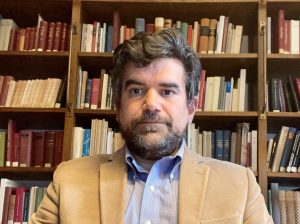
Lorenzo Vigotti, Kunsthistorisches Institut in Florenz
Presentation at the Annual Conference: “Diplomatic Exchanges and Architectural Inventions along the Silk Road: The Case of Soltaniyeh and Santa Maria del Fiore”
Session: Beyond the Silk Road
Lorenzo is a trained architect with a M. Arch. from the University of Florence, Italy, and a Ph.D. in architectural history from Columbia University with a dissertation on the origin of the Renaissance palace. He is currently a post-doc at the Kunsthistorisches Institut in Florence, where he studies the shift in spatial organization in domestic residences between the 14th and the 15th century, with an emphasis on early collecting practices and the birth of the studiolo as a manifestation of power by the urban oligarchy. Together with Shahid Beheshti University in Tehran, Iran, Lorenzo is exploring the circulation of architectural knowledge between medieval Persia and Italy, specifically the materiality and the problems of preservation of brick dome structures. Finally, he oversees the virtual reconstruction of the now lost Florentine ghetto at the Medici Archive Project.
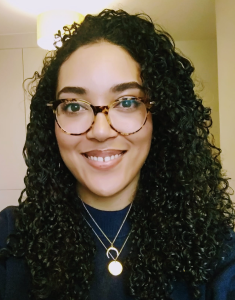
Ana Cristina Howie, University of Cambridge
Presentation at the Annual Conference: “’Favoured Black Attendants’ in ‘Splendid State Portraits’? Genoese merchants, Flemish painters, and the Spanish Atlantic Slave Trade”
Session: Archive, Object, Image: Reading Against the Grain in the Dutch and Spanish “Golden Ages”
Ana is originally from New Zealand and completed her bachelor’s degree in the History of Art and French at the University of Auckland. She continued her studies at the Université Paris-Sorbonne, then earned her MA in the History of Art at the Courtauld Institute in London, specializing in early modern Netherlandish artistic production. She began her PhD under the supervision of Professor Ulinka Rublack at the University of Cambridge in 2019, funded by the Prince of Wales International Scholarship. Her doctoral research investigates the relationships between women, dress, and portraiture in seventeenth-century Genoa, with a focus on the oeuvres of Flemish painters Peter Paul Rubens and Antony van Dyck. She is the recipient of the inaugural Society for Renaissance Studies/British School in Rome Residential Doctoral Research Scholarship for 2021/22. Her work and projects have been supported by the Royal Historical Society, Centre for Research in the Arts, Social Sciences and Humanities, Magdalene College, Cambridge, and the Cambridge Trust.
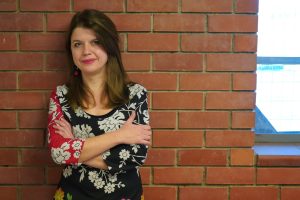
Iro Katsaridou, Museum of Byzantine Culture, Thessaloniki, Greece
Presentation at the Annual Conference: “Through Foreign Eyes: Curating the 1821 Greek War of Independence”
Session: Instrumentalizing Memory and the Politics of Commemoration
Iro Katsaridou was recently (2021) appointed Director of the Thessaloniki Museum of Photography, Greece. Previously, she has worked as curator of modern and contemporary art at the Museum of Byzantine Culture in Thessaloniki. She studied art history at the Aristotle University of Thessaloniki and the Université Paris I-Sorbonne, and also pursued museum studies at the City University of New York. Her doctoral dissertation (Aristotle University, 2010) focused on contemporary Greek photography. Iro has researched photography and art in wartime (World War I and II), curated exhibitions and edited related catalogues in this particular field. More recently (2021) she has curated an exhibition at the Museum of Byzantine Culture on the aspects of Philhellenic movements in art and the Greek War of Independence. She has taught as adjunct faculty at several Greek universities. She has co-edited two books on photography during the Nazi Occupation of Greece (1941-1944), one on the art of World War I in Greece, and written articles and book chapters on photography, museum policies, as well as the relationship between contemporary Greek art and politics. She has presented her research in international conferences, while in 2019 and 2020 she participated in the CAA-Getty International Program.
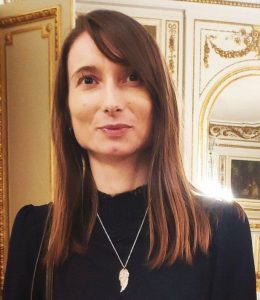
Jana Kantoříková, Sorbonne University/CNRS
Presentation at the Annual Conference: “Crucified Women: The Way of the Cross in the Symbolist Movement”
Session: Women in Art in the second part of the 19th century-early part of the 20th
Jana Kantoříková is an associated researcher at the Center of Interdisciplinary Research on Central, Eastern and Balkanic Europe at Sorbonne University/CNRS. She received her PhD in Slavic Philology, History of Czech Literature and Literary Theory at the Charles University in Prague and the University of Regensburg (2018). She taught at the University of Passau (Germany) and the Sorbonne University. Her research focuses on European modernisms and cultural transfers between France, Germany and the Czech lands, for example “Horror Fragmenti in Czech Symbolism” in Angst, Anxiety, Anguish in Fin de Siècle Art and Literature (Cambridge Scholars Publishing, 2020) or “Le Cycle de la volupté et de la mort : ‘livre empoisonné’ et ornementation du péché” in L’art (décoratif) du livre fin-de-siècle: éloge du parergon (Éditions Otrante, 2021). She is currently working on projects related to the reception of Friedrich Nietzsche in Central Europe and the blackness imagery in the Czech lands in the 19th century.
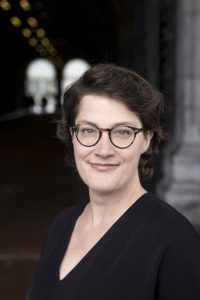
Judith Noorman, University of Amsterdam
Presentation: “The Invisibility Myth. Women, Art and Household Consumption in the Dutch Republic”
Session at the Annual Conference: Archive, Object, Image: Reading Against the Grain in the Dutch and Spanish “Golden Ages”
Judith Noorman is Assistant Professor of Art History in the Early Modern Period and Director of the Amsterdam Centre for Studies in Early Modernity (both at the University of Amsterdam). As of September 2021, she is leading a governmentally funded NWO VIDI project: The Female Impact. Women, Art and Household Consumption in the Dutch Republic, 1580-1720. She earned her PhD at the Institute of Fine Arts, New York University and has conducted postdoctoral research at the Drawing Institute, Morgan Library & Museum. At the 110th CAA Annual Conference, she is presenting a paper on The Invisibility Myth. Women, Art and Household Consumption in the Dutch Republic, as part of the HNA-sponsored session Archive, Object, Image: Reading Against the Grain in the Dutch and Spanish “Golden Ages”, which is chaired by Carrie J. Anderson and Marsely Kehoe.
CAA-GETTY INTERNATIONAL PROGRAM
Every year since 2012, the CAA-Getty International Program has enabled art historians, museum curators, and artists who teach art history to attend CAA’s Annual Conference. This program is funded on an annual basis by the Getty Foundation. Meet the CAA-Getty International Program participants here.
Committee on Women in the Arts (CWA) Picks: January/February
posted Jan 31, 2022
The January/February “Picks” selected by the Committee on Women in the Arts reflect on the difficult pursuit of creative freedom through idiosyncratic yet careful explorations of color, form, genre, and medium as well as voice and address. The results are odd, anxious atmospheres that test reality’s bodily contours and lament the strange alienations and lurking injustices that constitute normalcy.
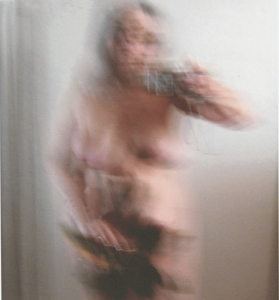
Joan Semmel, Untitled (Fem Folio), 2007, Digital Print, 12 x 12 inches, copyright©Joan Semmel/Artists Rights Society (ARS) New York
Mika Tajima: You Must Be Free
January 22 through March 12, 2022
Kayne Griffin, Los Angeles
From an early investigation into the regulatory and relational structures of human bodies in built environments, Mika Tajima’s recent work extends her inquiry into the conditions of human agency and self-determinacy. This exhibition focuses on the necessity and impossibility of freedom in our contemporary moment. The title, You Must Be Free, appears as an external command to achieve freedom and produces a contradictory tension that reveals a social limit to its practice. The speech act presents freedom as a pressing desire and controlling demand on the subject, underlining the entwinement of control and freedom. The animating force of this paradoxical directive is manifested in this exhibition as air pressure and its circulation through contained and porous objects and architecture.
Brittany Tucker: Burnout
January 8 through February 5, 2022
Steve Turner Gallery, Los Angeles, California
Burnout is a solo exhibition by Vienna-based Brittany Tucker featuring new large-scale loosely rendered paintings, half of which incorporate text that was spray-painted on in a street-tag manner. Tucker’s works of the past few years often juxtaposed a realistic likeness of the artist interacting with cartoon-like characters. In these works, her principal cartoon nemesis of the past, a smiling, often taunting white man, is featured in but one canvas, where he is spilling black paint off the bottom edge of the canvas. Hand prints and foot prints mark the background around him, but Tucker is otherwise absent from the scene. When Tucker’s likeness appears in other works, she appears to be uncomfortable, contorted, or obscured. According to the artist, these works represent her desire to shut out the world’s expectations of a Black female artist and to work more impulsively. As a consequence, they represent an unrestrained portrait of her psychological state as an expat living, working and studying in Vienna in which confusion, sadness, emotional fragility, self-reflection, honesty and ultimately courage and optimism are portrayed.
Joan Semmel: Skin in the Game
October 28, 2021 through April 3, 2022
Pennsylvania Academy of Fine Arts, Philadelphia, Pennsylvania
Joan Semmel: Skin in the Game includes approximately 40 paintings that show the remarkable continuity and assiduity of Semmel’s practice, and focus on four main themes—erotic abstraction; the self; expressive figuration; and photography and painting—that traverse five decades of work and reveal a strong counter narrative to the traditional telling of the history of painting in the United States from the late 1960s to today. Semmel’s work reflects the ongoing struggle for women’s equal representation and power to make decisions about their own bodies and sexuality while centering female empowerment through the self. In Semmel’s own words: “I do not pretend to address the problems of all women in the world. My work is personal and I speak for myself. Women artists have to speak for themselves and then unite to fight the political fight.”
Allison Katz—Artery
January 14 through March 13, 2022
Camden Art Centre, Arkwright Road, London
Attending to the idiosyncratic and eccentric, to personal mythologies and embodied experience, painter Allison Katz treats her own biography as source material, as well as drawing from dream objects, art historical references, and the texture of everyday life. Her exhibition unfolds through a series of biographical anecdotes and moments of synchronicity, opening the world up to a game of allusions, double entendre, slips and wordplay.
Emily: Desert Painter of Australia
January 21 through March 12, 2022
Gagosian, Paris, France
Emily: Desert Painter of Australia is the first solo exhibition in France of the work of Emily Kame Kngwarreye (1910–1996). Emily is unique among Indigenous Australian painters for her rapid and systematic exploration of different styles and for her bold inventiveness with regard to form and color. Over time, her mesmerizing early “dot” paintings ceded to more gestural canvases, reduced in their detail and liberated in their formal qualities. Until her death in 1996, she painted prolifically on both intimate and grand scale, with brushes, sticks, and fingertips on unstretched linen laid flat on the ground, sitting beside or within the composition itself
Laurie Anderson: The Weather
September 24, 2021 through July 31, 2022
Hirshorn Museum and Sculpture Garden, Washington D.C.
Laurie Anderson: The Weather is the largest-ever U.S. exhibition of artwork by celebrated multimedia artist Laurie Anderson. Spanning her groundbreaking video and performance works from the 1970s to recent years, the exhibition guides visitors through an immersive audiovisual experience in the Museum’s second-floor galleries. This dynamic survey showcases the artist’s boundless creative process by highlighting time-based media, including To the Moon (2018), a 15-minute virtual reality work, as well as the largest exhibition of her paintings to date.
Lucy Kim: Skin Might See
January 24 – March 5, 2022
University Gallery, UMASS Lowell
Skin Might See includes the first gallery showing of Kim’s Knife Paintings, as well as work from her Auto-Synthetic series. Kim is a visual artist who uses mold making and illusionistic painting to create hybrid objects that navigate the borderlands between painting and sculpture. She describes mold making and casting as a “sculptural surrogate for photography.” In both bodies of work there is intrigue in the tension between skin and cast surface. Curator Julie Poitras Santos wrote that in Kim’s oeuvre “the surface skin competes for visual primacy with the three dimensional form…“ These startling integuments often seem at odds with the kitchen accoutrements and other structures that lie beneath, creating a frisson and a place of interrogation between media and meaning.
Black History Month and the 110th Annual Conference
posted Jan 31, 2022
Each week this Black History Month, we highlight the rich scholarship and programs produced at CAA that celebrate, recognize, and interrogate Black art, history, and experience. This week, we look forward to the research and scholarship that will be presented virtually at the upcoming Annual Conference. Many sessions feature talks that look at or investigate Blackness, racism, colonialism, neo-colonialism, and slavery, Black identity, theory of race, Afrofuturism, queerness, the African diaspora, and intersections between these topics.
In chronological order:
February 17-19:
Reimagining the Past alongside Black Women Artists, Thursday, February 17, 2022, 9:00 – 10:30 a.m. CST (10:00 – 11:30 a.m. EST)
Latinx Bodies: Presence/absence and representation (Part 1) , Thursday, February 17, 2022, 9:00 – 10:30 a.m. CST (10:00 – 11:30 a.m. EST)
To See, to Keep, to Know: Photography and Intergenerational Knowledge Production, Thursday, February 17, 2022, 11:00 – 12:30 p.m. CST (12:00 – 1:30 p.m. EST)
Archive, Object, Image: Reading Against the Grain in the Dutch and Spanish “Golden Ages,” , Thursday, February 17, 2022, 11:00 – 12:30 p.m. CST (12:00 – 1:30 p.m. EST)
U.S. Latinx Art, Pre-1950 ,Thursday, February 17, 2022, 11:00 – 12:30 p.m. CST (12:00 – 1:30 p.m. EST)
Latinx Bodies: Presence/Absence and Representation (Part 2) , Thursday, February 17, 2022, 2:30 – 4:00 p.m. CST (3:30 – 5:00 p.m. EST)
Haunting and Memory in Arts of Africa and the African Diaspora , Friday, February 18, 2022, 9:00 – 10:30 a.m. CST (10:00 – 11:30 a.m. EST)
The air we breathe: aesthetics and politics of the breath in transpacific and transatlantic visual cultures ,Friday, February 18, 2022, 9:00 – 10:30 a.m. CST (10:00 – 11:30 a.m. EST)
Flipping the Script , Friday, February 18, 2022, 2:30 – 4:00 p.m. CST (3:30 – 5:00 p.m. EST)
(re)activation of Exhibitions as sites of contestation, Friday, February 18, 2022, 4:30 – 6:00 p.m. CST (5:30 – 7:00 p.m. EST)
Decolonial Teaching Methodologies in Digital Arts & Design, Saturday, February 19, 2022, 9:00 – 10:30 a.m. CST (10:00 – 11:30 a.m. EST)
What’s the “matter” with American Sculpture?, Saturday, February 19, 2022, 9:00 – 10:30 a.m. CST (10:00 – 11:30 a.m. EST)
Signs o’ the Times: Music and Politics in Contemporary Art ,Saturday, February 19, 2022, 9:00 – 10:30 a.m. CST (10:00 – 11:30 a.m. EST)
The Price of Blackness: African American art and visual culture in the first two decades of the Twenty-First Century, Saturday, February 19, 2022, 11:00 – 12:30 p.m. CST (11:00 – 12:30 p.m. EST)
Knowing People: Black Practices in Queer Collaborations, Saturday, February 19, 2022, 2:30 – 4:00 p.m. CST (3:30 – 5:00 p.m. EST)
‘Heresies’ and Other Mythologies, Saturday, February 19, 2022, 2:30 – 4:00 p.m. CST (3:30 – 5:00 p.m. EST)
Signs o’ the Times: Music and Politics in Contemporary Art, Part II ,Saturday, February 19, 2022, 2:30 – 4:00 p.m. CST (3:30 – 5:00 p.m. EST)
Toward an Inclusive Methodology: Experiments in Art Writing,Saturday, February 19, 2022, 4:30 – 6:00 p.m. CST (5:30 – 7:00 p.m. EST)
March 3-5
Women in Architecture: The African Exchange,Thursday, March 3, 2022, 9:00 – 10:30 a.m. CST (10:00 – 11:30 a.m. EST)
The Promise of Modern Art and Design: Cold War-Era Art and Diplomacy,Thursday, March 3, 2022, 9:00 – 10:30 a.m. CST (10:00 – 11:30 a.m. EST)
DESIGN INCUBATION COLLOQUIUM 8.2: RECENT RESEARCH IN COMMUNICATION DESIGN , Thursday, March 3, 2022,9:00 – 10:30 a.m. CST (10:00 – 11:30 a.m. EST)
Blackness and the Ashcan School, Thursday, March 3, 2022, 2:30 – 4:00 p.m. CST (3:30 – 5:00 p.m. EST)
Carnival in Africa, Friday, March 4, 2022, 9:00 – 10:30 a.m. CST (10:00 – 11:30 a.m. EST)
Curatorial Care: Feminist and Queer Practices ,Friday, March 4, 2022,9:00 – 10:30 a.m. CST (10:00 – 11:30 a.m. EST
Reading Kerry James Marshall’s ‘Rythm Mastr’, Friday, March 4, 2022, 11:00 – 12:30 p.m. CST (12:00 – 1:30 p.m. EST)
Transnational, Transcultural, Transversal: On the Decolonial Discourse of Art,Friday, March 4, 2022, 11:00 – 12:30 p.m. CST (12:00 – 1:30 p.m. EST)
Black Collage, Friday, March 4, 2022, 2:30 – 4:00 p.m. CST (3:30 – 5:00 p.m. EST)
Abolitionist Aesthetics, Friday, March 4, 2022, 4:30 – 6:00 p.m. CST (5:30 – 7:00 p.m. EST)
Art History and Social Justice in Practice ,Friday, March 4, 2022,4:30 – 6:00 p.m. CST (5:30 – 7:00 p.m. EST)
Activist Exhibitions, Friday, March 4, 2022, 4:30 – 6:00 p.m. CST (5:30 – 7:00 p.m. EST)
On Afro-pessimism and Its Alternatives ,Saturday, March 5, 2022, 9:00 – 10:30 a.m. CST (10:00 – 11:30 a.m. EST)
Reconsidering Art History Through Access ,Saturday, March 5, 2022, 9:00 – 10:30 a.m. CST (10:00 – 11:30 a.m. EST)
New Perspectives in Art, Design, and Art History: Supporting and Showcasing Emerging Voices from Marginalized Communities ,Saturday, March 5, 2022, 2:30 – 4:00 p.m. CST (3:30 – 5:00 p.m. EST)
New Ways of Seeing ,Saturday, March 5, 2022, 2:30 – 4:00 p.m. CST (3:30 – 5:00 p.m. EST)
Botanical Intimacies: Colonialism, Decolonial Practice, and Queered Ecologies , Saturday, March 5, 2022,4:30 – 6:00 p.m. CST (5:30 – 7:00 p.m. EST)
CAA 2022 Awards for Distinction
posted Jan 24, 2022
CAA announces the 2022 recipients of Awards for Distinction. By honoring outstanding member achievements, CAA reaffirms its mission to encourage the highest standards of scholarship, practice, connoisseurship, and teaching in the arts. With these annual awards, CAA seeks to honor individual artists, art historians, authors, museum professionals, and critics whose accomplishments transcend their individual disciplines and contribute to the profession as a whole and to the world at large.
Among the awards, the Distinguished Artist Award for Lifetime Achievement is presented to Betye Saar who has not only forged a singular practice for six decades but has also influenced generations of artists, makers, and thinkers. Calling upon the legacies of artists like Joseph Cornell, her symbolic and potent assemblages, of which she’s best known, reflect on the lives, experiences, and identities of African Americans, spirituality, and cultural connectivity.
The Distinguished Lifetime Achievement Award for Writing on Art is presented to Wu Hung. Perpetually interested in the shape of time, in relation to the time of the world, he has authored many books, essays, and exhibition catalogues that bring Chinese visual culture into different orders of focus, taking into account the changing conditions of tombs, screens, performances, and protests. The scope of his work has an epic quality, allowing arguments to unfold across centuries without losing sight of the very human presence of artists and audiences.
Art Journal Award
Alfred H. Barr Jr. Award
Alfred H. Barr Jr. Award for Smaller Museums, Libraries, Collections, and Exhibitions
Frank Jewett Mather Award
Charles Rufus Morey Book Award
Elina Gertsman, The Absent Image: Lacunae in Medieval Books, Penn State University Press, 2021.
Arthur Kingsley Porter Prize
Artist Award for a Distinguished Body of Work
Kent Monkman
CAA/AIC Award for Distinction in Scholarship and Conservation
Zahira Véliz
Distinguished Artist Award for Lifetime Achievement
Betye Saar
Distinguished Lifetime Achievement Award for Writing on Art
Wu Hung
Distinguished Feminist Award – Artist
In lieu of the Distinguished Feminist awards, we will recognize leaders in the field of feminist art and art history in our 2022 programming highlighting the 50th Year Anniversary of feminism at CAA.
Distinguished Feminist Award – Scholar
In lieu of the Distinguished Feminist awards, we will recognize leaders in the field of feminist art and art history in our 2022 programming highlighting the 50th Year Anniversary of feminism at CAA.
Distinguished Teaching of Art Award
Fred Hagstrom
Distinguished Teaching of Art History Award
Terry Smith
Excellence in Diversity Award
Citations:
Art Journal Award
In organizing a course of study predicated on the ontological challenge to discourses of art offered by trans and nonbinary positions, David J. Getsy and Che Gossett have generously identified a major lacuna in the field and provided a toolkit for its amelioration. The jury unanimously selected their “A Syllabus on Transgender and Nonbinary Methods for Art and Art History” as the most distinguished contribution to the Art Journal in 2021. The syllabus not only identifies, positions, and summarizes critical scholarship in the field of transgender and nonbinary studies, it also demonstrates the fruitful integration of pedagogy and emerging research methodologies. Noting the relative dearth of art historical scholarship that has taken up trans methods and histories, the authors suggest the ways in which key themes and terms from art might be critically reevaluated in light of transgender studies. An introduction to each section’s bibliography synthesizes complex debates and individual arguments with remarkable clarity. Sensitive to the necessary intersections of trans analytics with critical approaches to race, ability, and class, the authors highlight readings from Black feminist thought and abolition optics, among other transversal concerns, that elucidate points of fracture within and strategies of resistance to the regulatory gender binary. At once rigorous and accessible, Getsy and Gossett’s contribution offers an adaptable blueprint for researchers and educators.
Committee:
Omar Kholeif, Sharjah Art Foundation
Tilo Riefenstein, School of the Arts, York St John University
Phil Taylor, George Eastman Museum (Chair)
Alfred H. Barr Jr. Award
America is haunted. Genocidal policies unleashed on Native Americans; the horror of the transatlantic slave trade; war, racism, and social injustice; dark passages in community and individual histories – these traumas and more have left behind a trail of spirits. Taking as its topic the paranormal in American art, Supernatural America reveals the myriad ways in which citizens and artists have sought to see, understand, or come to terms with the ghosts of the past. Lavishly illustrated, with many images never seen before, Supernatural America breaks new ground in presenting the paranormal as a historical subject of wide-ranging importance. Incisive essays by scholars and artists cover painting and sculpture from the late 18th century to the present, spirit photography, art channeled through mediums, spiritualist paraphernalia, folk and outsider art, UFO-inspired materials, video and installation from a range of perspectives. This revealing, thought-provoking investigation into an emerging scholarly field gives proof to William Faulkner’s well-known line: ‘The past is never dead. It’s not even past’.
Committee:
Susan Aberth, Bard College
Benjamin Anderson, Cornell
Karen Lang, University of Arizona
Andrew Saluti, Syracuse University (Chair)
Joyce Tsai, Clyfford Still Museum
Alfred H. Barr Jr. Award for Smaller Museums, Libraries, Collections, and Exhibitions
In 2015 the Ryerson Image Centre acquired the archives of Berenice Abbott, including more than 6000 photographs and 7000 negatives, her papers, correspondences, and manuscripts. One of the key figures in the history of documentary photography, Abbott is now known as an archivist as well as an artist. It was Abbott who preserved Eugene Atget’s archives at the end of the twenties and published his work. Her own photographs, taken while working for the WPA, consolidated her reputation as a documentary photographer. What exactly is that reputation? In order to answer that question, Documentary in Dispute meticulously reconstructs the manuscript of the book Changing New York, first published in 1939 by Dutton & Co, with photographs by Berenice Abbott and text by renowned art critic Elizabeth McCausland. In a tour de force of archival research and scholarly presentation, Sarah M. Miller reveals how the project was altered to obscure the aesthetic, political and ethical values of photographer and author. Miller’s beautifully written, highly focused essay on Abbott and McCausland situates them in an international avant-garde which recognized the potential of image and text to transform, even to break, our habits of seeing and being. Miller’s overall approach recalls Walter Benjamin’s own in the 1930s. Not coincidentally, Benjamin was inspired by Abbott’s archival and photographic achievements.
Committee:
Susan Aberth, Bard College
Benjamin Anderson, Cornell
Karen Lang, University of Arizona
Andrew Saluti, Syracuse University (Chair)
Joyce Tsai, Clyfford Still Museum
Frank Jewett Mather Award
The jury has unanimously selected Kaira M. Cabañas’ Immanent Vitalities: Meaning and Materiality in Modern and Contemporary Art. Cabañas has written a highly readable volume addressing the material relations between objects and subjects as well as addressing the limiting institutional conventions of academic art history. Her work draws upon theories of new materialism, an animating force that, when attended to, requires rethinking binary categories such as living and inert or life and matter. Cabañas’ volume traverses histories and hemispheres: from the perceptual doubts engendered by the force of color in Alejandro Otero’s paintings to the enmeshed material contingencies of Gego’s metal sculptures, from the sensorial therapeutic propositions of Lygia Clark’s relational objects to the curatorial entanglements of Alessandro Balteo-Yazbeck’s challenges to the grid, and from the affective agencies Mario Pedrosa located in the paintings of Djanira da Motta e Silva to the documented rituals of care obfuscating boundaries between the organic and the inorganic in Matheus Rocha Pitta’s Polaroids. Cabañas proposes an alternative to the kind of nation-bounded analyses that often burden studies of modern and contemporary art of Latin America. She addresses academic art history’s tendency to isolate along geographic lines, marginalizing practices and scholarship. Cabañas’ text thus models a critical strategy for assessing not just artworks but the field itself.
Committee:
Julia Bryan-Wilson, University of California, Berkeley
Kim Theriault, Dominican University
Andrew Wasserman, Dominican University (Chair)
Charles Rufus Morey Book Award
Elina Gertsman, The Absent Image: Lacunae in Medieval Books, Penn State University Press, 2021.
Countering the customary interpretation of late medieval art as relentlessly profuse and exuberant, Elina Gertsman’s The Absent Image: Lacunae in Medieval Books, explores different constructions of emptiness ranging from the presentation of voids in illustrations to represent the unrepresentable to the deliberate inclusion of physical holes in manuscript pages designed to reveal portions of other pages. Gertsman’s investigation of the “fecundity of emptiness” is a generative and compelling topic for scholars of art history/visual studies across areas, both within and outside Medieval Studies. She argues and demonstrates that, between 1200s and 1500s, the broad circulation of scientific thought and its engagement with theology and formal and literary discourses on emptiness, absence, and negation account for visual, cognitive, and material expressions on the pages of medieval books. Cross-disciplinary in its approach, Gertsman’s book simultaneously draws attention to the visual and material aspects of the manuscripts, phenomenological experience, and philosophical, religious, and scientific theories of the period. In doing so she uncovers an unexpected kinship between the medieval artists and the modernist avant-garde, where the void is regarded as the locus of the sublime and of boundless possibility. Her erudite writing and compelling approach to the subject poses questions throughout that magnify the relevance of her study and stimulate personal inquiry—as a reader reflects on other areas of consideration across time called out in the text. The book is lavishly illustrated and artfully designed with a shape and size complementary to the subject of study.
Committee:
John Cunnally, Iowa State University
Christina Hellmich, Fine Arts Museums of San Francisco
Laura Anne Kalba, University of Minnesota
Lisa D. Schrenk, University of Arizona
Dorothy Wong, University of Virginia (Chair)
Arthur Kingsley Porter Prize
Marius Hauknes offers a riveting and multi-layered interpretation of the role of spectatorship in the production of meaning in the 13th-century crypt of the Anagni Cathedral. Rather than consider a viewer as a passive onlooker, he devotes attention to multiple aspects of embodied spectatorship: movement, (shifting) angles/perspectives, (in)visibility, temporality, and knowledge. These offer a powerful vantage point from which to consider the intersection of the painting program with the body itself. Drawing attention to contemporary concerns and interests in the body’s health, its cognitive capacities (and limits), and its place in the universe, Hauknes places the paintings into conversation with medicine and astrology. The images emerge as intellectual acts in a religious and political setting that grappled with problems of temporality and being. Hauknes evinces deep and extensive scholarly research, and is able to draw precise and appropriate insights from contemporary cultural and historical contexts, without losing focus on the artwork itself. While offering compelling readings of specific scenes — showing how they could connect, overlap, or echo with one another — Hauknes posits that comprehensive spectatorship was not possible. Instead, human comprehension and temporality contrasts with the divine, creating a space for reflection on the need for medicine and astrology.
Committee:
Nathan T. Arrington, Princeton University (Chair)
Susanna Berger, University of Southern California
Rachel Miller, California State University, Sacramento
Artist Award for a Distinguished Body of Work
Kent Monkman
There is a long-standing history in the visual arts of artists bearing witness to atrocities: Goya’s painting “The Third of May,” Picasso’s “Guernica,” to name but two. Toronto-based Cree artist Kent Monkman’s exhibition “Shame and Prejudice: A Story of Resilience” follows this tradition, with a few notable updates. On the occasion of Canada’s 150th anniversary in 2017, Monkman’s paintings featured in a cross-country touring exhibit that culminated at the University of British Columbia’s Museum of Anthropology, August 6, 2020 – January 3, 2021, provides a searing critique of Canada’s colonial policies past and present, including, in the artist’s accounting: “the signing of the numbered treaties, the reserve system, genocidal policies of the residential schools, mass incarceration and urban squalor.” This is a body of work that, though tackling a grim subject matter, is often a blend of subversive humor, fantasy, and homoeroticism. And, although appropriating the form of Western history painting, Monkman’s artwork breaks from tradition by subverting and de-centering the Western gaze and re-presenting a perspective of history from the vantage point of the Indigenous peoples. Albeit, a history filtered through the particular lens of an artist who identifies as both queer and two-spirit, and through his trickster alter-ego, Miss Chief Share Eagle Testickle, the protagonist within much of Monkman’s paintings and performances. Through his use of history painting, Monkman’s project is one that reminds us of the potency of images, and the potential of the artist to provoke and challenge history and its representations.
Committee:
Stephen Fakiyesi, Independent Artist, Toronto
Jessica Hong, Hood Museum, Toledo Art Museum
Beauvais Lyons, University of Tennessee, Knoxville, (Chair)
CAA/AIC Award for Distinction in Scholarship and Conservation
Zahira Véliz
Zahria (Soni) Véliz has enhanced our understanding of art through her numerous, scholarly publications to the fields of art history and paintings conservation. Dr. Véliz has strengthened the methodological approaches of scholars who work on Spanish artists and Franz Kline through her publication record as well as her generosity as a colleague.
Through the translation and dissemination of Spanish texts, Dr. Véliz’s has made contemporaneous information about early modern painting accessible to researchers who do not read Spanish. Artists Techniques in Golden Age Spain (1987) is often cited in technical studies of Spanish paintings. More recently, Dr. Véliz edited a translation of Jusepe Martínez’s 1673-75 Practical Discourses on the Most Noble Art of Painting (2017). These publications, along with others by Dr. Véliz on subjects including blue pigments, wooden panels, and drawing practice, have been foundational to the study of Spanish art in the United States.
Dr. Véliz’s PhD dissertation on Alonso Cano served as a foundation for many publications on the artist. In addition, Dr. Véliz’s knowledge and skills of connoisseurship regarding Spanish drawing enriched her drawings catalogues for the Courtauld Institute of Art in London and the Museo de Bellas Artes in Asturias. As Senior Paintings Conservator for the Museum of Fine Arts, Houston, Dr. Véliz published her research into a newly attributed painting to Diego Velázquez as well as technical and art historical research on Franz Kline’s paintings that are models of collaborative research.
Committee Members:
Jim Coddington, American Institute of Conservation
Tiarna Doherty, University of Delaware, (Chair)
Fernanda Valverde, Amon Carter Museum
Distinguished Artist Award for Lifetime Achievement
Betye Saar
Betye Saar (b. 1926, Los Angeles, CA) has not only forged a singular practice for six decades but has also influenced generations of artists, makers, and thinkers. Calling upon the legacies of artists like Joseph Cornell, her symbolic and potent assemblages, of which she’s best known, reflect on the lives, experiences, and identities of African Americans, spirituality, and cultural connectivity. Part of the broader Black Arts Movement in the 1970s, Saar also confronted issues of racism and sexism in groundbreaking and radical works like The Liberation of Aunt Jemima (1972). Saar contends the continual thread in her work is her “curiosity about the mystical.” As she wrote in 1998, “I am intrigued with combining the remnant of memories, fragments of relics and ordinary objects, with the components of technology. It’s a way of delving into the past and reaching into the future simultaneously. The art itself becomes the bridge. Curiosity about the unknown has no boundaries. Symbols, images, place and cultures merge. Time slips away. The stars, the cards, the mystic vigil may hold the answers. By shifting the point of view an inner spirit is released. Free to create.” By foregrounding the mystical, Saar sees people, cultures, contexts, temporalities as part of a larger, interconnected spiritual fabric, an understanding that is needed in a time of extreme ideological polarization, inequities, and geopolitical strife. Saar and her practice continue to resonate and inspire current generations and those to come.
Committee:
Stephen Fakiyesi, Independent Artist, Toronto
Jessica Hong, Hood Museum, Toledo Art Museum
Beauvais Lyons, University of Tennessee, Knoxville, (Chair)
Distinguished Lifetime Achievement Award for Writing on Art
Wu Hung
Trained in both China and the United States, Wu Hung’s writing brings perspectives native to both cultures to bear on aesthetics, art history, and archaeology. His arguments ground the cultures of China, from the earliest ancient survivals to the interventions of our own time in structures of mind that defy the progress narratives of the West. He has received countless awards for work that has transformed the study of East Asian art and drawn attention to the relationship between images and the spaces within which they are observed, from the Dunhuang caves to the double screens to Zhu Jinshi’s Fangzhen: A Cubic Meter of Canvas in Berlin.
Overall, his writings explore the many, restless transitions across time and space. Perpetually interested in the shape of time, in relation to the time of the world, he has authored many books, essays, and exhibition catalogues that bring Chinese visual culture into different orders of focus, taking into account the changing conditions of tombs, screens, performances, and protests. The scope of his work has an epic quality, allowing arguments to unfold across centuries without losing sight of the very human presence of artists and audiences. He works in the discipline of art history as a poet-scholar who knows the brushstroke from the inside out, crafting prose of great clarity and nuance that opens the field to specialists and new readers alike.
Distinguished Feminist Award – Artist
In lieu of the Distinguished Feminist awards, we will recognize leaders in the field of feminist art and art history in our 2022 programming highlighting the 50th Year Anniversary of feminism at CAA.
Committee:
Robin Cass, Rochester Institute of Technology (Chair)
Delinda J. Collier, School of the Art Institute of Chicago
Midori Yoshimoto, New Jersey City University
Distinguished Feminist Award – Scholar
In lieu of the Distinguished Feminist awards, we will recognize leaders in the field of feminist art and art history in our 2022 programming highlighting the 50th Year Anniversary of feminism at CAA.
Committee:
Robin Cass, Rochester Institute of Technology (Chair)
Delinda J. Collier, School of the Art Institute of Chicago
Midori Yoshimoto, New Jersey City University
Distinguished Teaching of Art Award
Fred Hagstrom
Fred Hagstrom, a member of the Carleton College faculty since 1984, is the 2022 recipient of the CAA Distinguished Teaching of Art Award. Hagstrom’s nomination included endorsements from former students and colleagues, including a listing of 341 former students who have taken his printmaking, book arts, and drawing classes. Hagstrom also directed a bi-annual study abroad 10-week trip for students to Australia, New Zealand, and the Cook Islands twelve times over twenty years, where students learned about South Pacific and Maori art and culture. Based on this experience, Dylan Yvonne Welch (BA, ‘08) recalls “Each trip, he candidly and humbly facilitates conversations about colonial history, racism and art. As a student, this was a breath of fresh air as I had found that many other professors seemed uncomfortable or simply avoided discussing those topics.” Eleanor Jensen (BA, ’01) credit him with teaching her to both see and draw, while also observing that “Fred is deeply sensitive to his students and is always ready to stand up for somebody who has been harmed or overlooked.” Students observed that Hagstrom’s classes were interdisciplinary, challenging them to connect their studies in other disciplines as well as their life stories to their studio work. Jade Hoyer credits Professor Hagstrom with being a mentor long after she graduated in 2007. Fred Hagstrom has profoundly impacted his students, many of whom have pursued careers as artists and educators. We are pleased to recognize Fred Hagstrom’s more than three decades of teaching with this award.
Committee:
Stephen Fakiyesi, Independent Artist, Toronto
Jessica Hong, Hood Museum, Toledo Art Museum
Beauvais Lyons, University of Tennessee, Knoxville, (Chair)
Distinguished Teaching of Art History Award
Terry Smith
Terry Smith has long written, curated and taught across borders, in the beginning coming from Australia to study and work in New York as both a scholar and an active member of Art & Language. He has been expanding his sights ever since. He has long advocated for the study of indigenous art. For the past twenty years, starting with projects such as Global Conceptualism: Points of Origin, 1950s -1980s at the Queens Museum, he was the trusted collaborator of Okwui Enwezor. He has always insisted that the past and the present be given their due consideration and global perspectives.
All of this came to his teaching. Students have understood the breadth of his expertise and curiosity; they have used them as inspiration for their own paths; they have appreciated his warmth, his encouragement and the gift of his time. The example he has set as an art historian and a curator has had visible effects in the ranks of university professors and museum curators in the United States and abroad. They do not conform to a single, theoretical way. His students repeatedly speak of his belief in the independent existence of the art object and at the same time his insistence that it be grounded and imbricated in its own real time social relations. Art is allowed its scale, its interior place in our minds, and its exterior place in our world.
Committee:
Shirin Fozi, University of Pittsburgh (Chair)
Joseph Masheck, Hofstra University
Molly Nesbit, Vassar College
Excellence in Diversity Award
Committee:
Carmelita Higgenbotham, Virginia Commonwealth University
Kelly Murdoch-Kitt, University of Michigan
Sohl Lee, Stony Brook University



